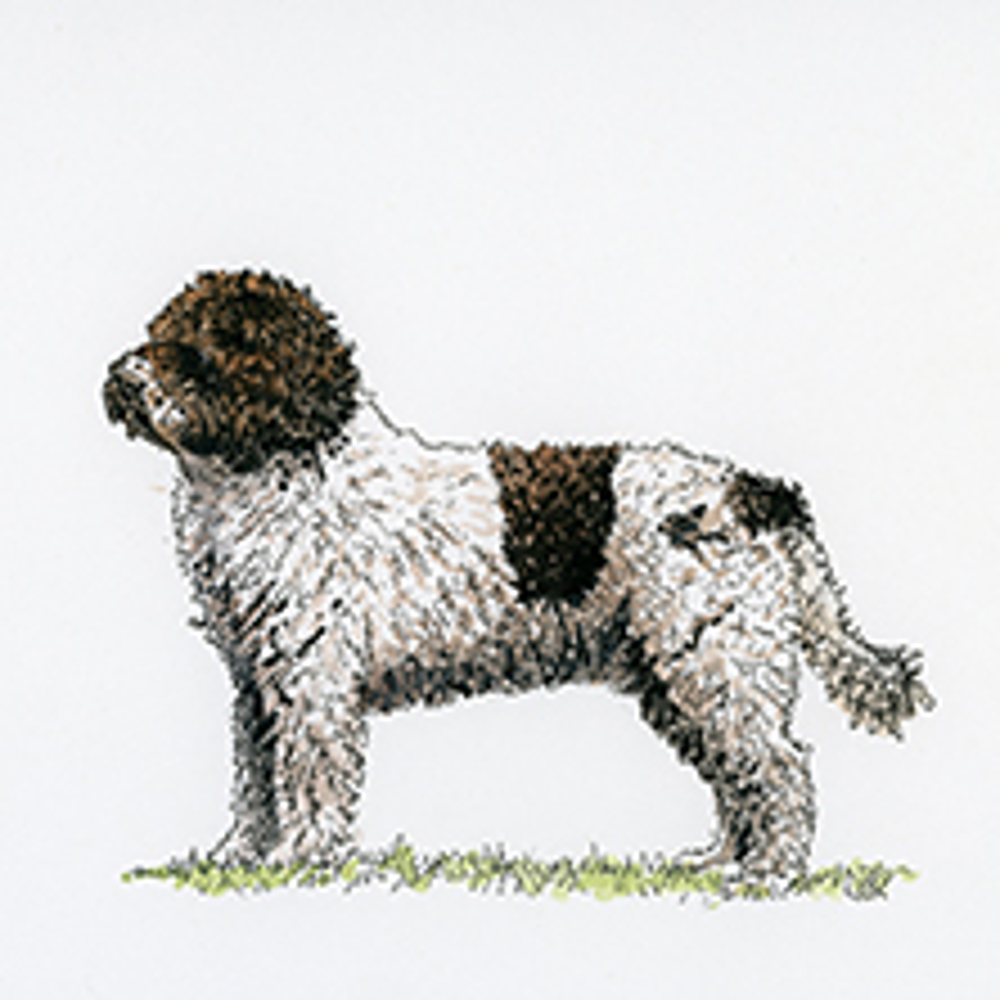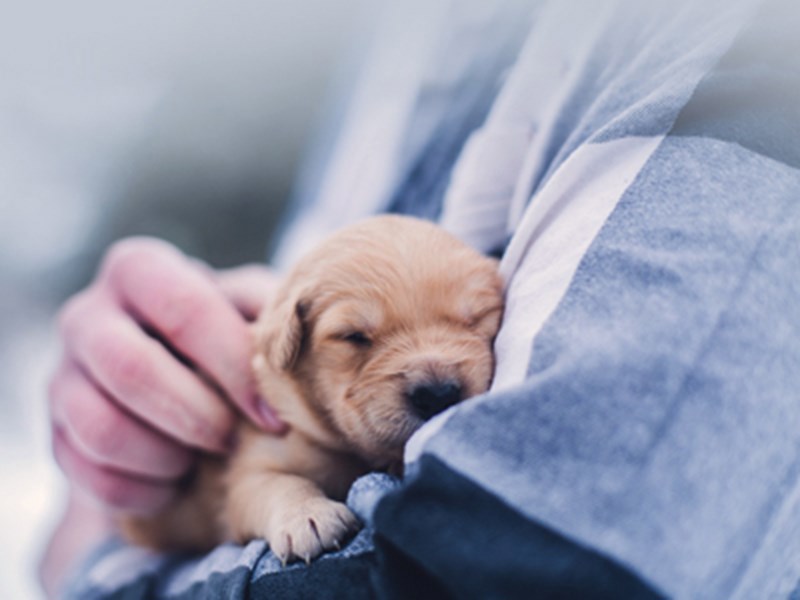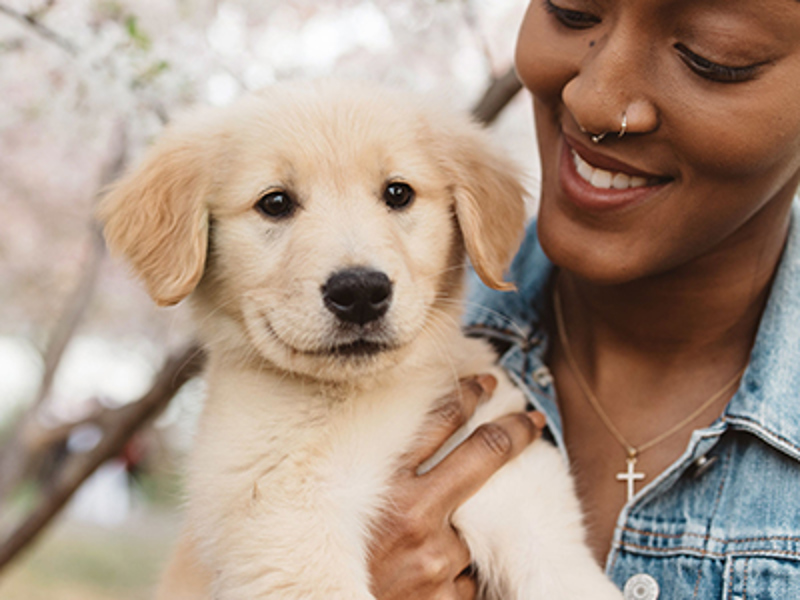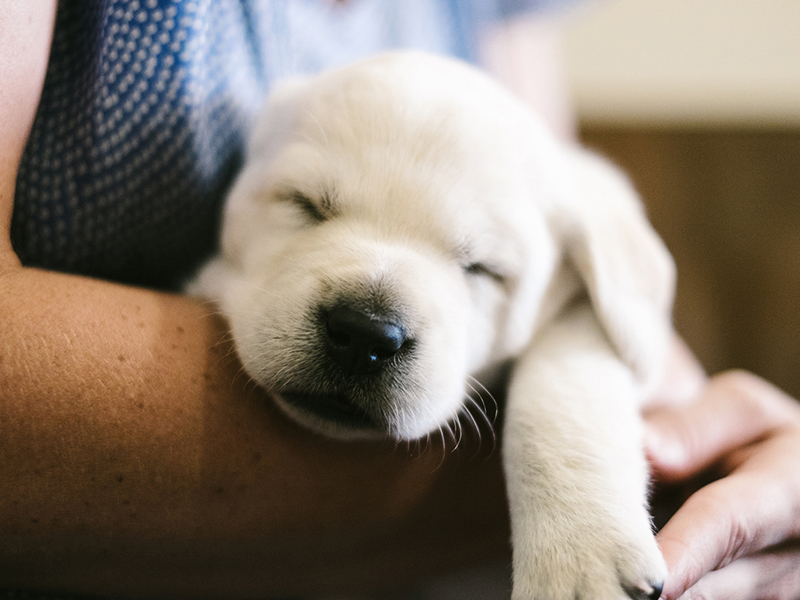
Spanish Water Dog
Breed characteristics
- Size
- Medium
- Exercise
- Up to 1 hour per day
- Size of home
- Small house
- Grooming
- More than once a week
- Coat length
- Medium
- Sheds
- No
- Lifespan
- Over 10 years
- Vulnerable native breed
- No
- Town or country
- Country
- Size of garden
- Small/ medium garden
About this breed
Although the Spanish Water Dog was primarily a retriever of wildfowl, he has also traditionally been used as a herder of sheep. His thick coat, a feature of the breed, requires clipping once or twice each year.
Images for this breed
The Gundog breed group
Dogs that were originally trained to find live game and/or to retrieve game that had been shot and wounded. This group is divided into four categories - Retrievers, Spaniels, Hunt/Point/Retrieve, Pointers and Setters - although many of the breeds are capable of doing the same work as the other sub-groups. They make good companions, their temperament making them ideal all-round family dogs.
Breed standard colours
Breed standard colour means that the colour is accepted within the breed standard and is a traditional and well-known colour in this breed.
Breed standard colours in this breed include:
- Black
- Black & Tan
- Black & White
- Black With White Markings
- Brown
- Brown & Tan
- Brown & White
- Brown With White Markings
- Cream
- Cream & White
- Cream With White Markings
- Gold & White
- Gold With White Markings
- Tricolour
- White
- White & Black
- White & Brown
- White & Cream
- White & Gold
Other colour/s
'Other' means you consider your puppy to be a colour not currently known within the breed and one that does not appear on either the breed standard or non-breed standard list. In this instance you would be directed through our registrations process to contact a breed club and/or council to support you on identifying and correctly listing the new colour.
Non-breed-standard colours
Non-breed-standard colour means that the colour is not accepted within the breed standard and whilst some dogs within the breed may be this colour it is advised to only select a dog that fits within the breed standards for all points.
Colour is only one consideration when picking a breed or individual dog, health and temperament should always be a priority over colour.
Health
Whether you’re thinking of buying a puppy, or breeding from your dog, it’s essential that you know what health issues may be found in your breed. To tackle these issues we advise that breeders use DNA tests, screening schemes and inbreeding coefficient calculators to help breed the healthiest dogs possible.
More about health
Priority health schemes and tests
The Kennel Club's Assured Breeders must use the following (or equivalent) schemes, tests and advice. All other breeders are strongly advised to also use these.
- Hip dysplasia screening scheme (BVA/KC)
- Eye testing - PLA (gonioscopy) (BVA/KC/ISDS)
- Eye screening scheme (BVA/KC/ISDS)
- DNA test - prcd-PRA - part of The Kennel Club DNA Testing Services* (see below). Find a list of tested dogs
Important health schemes and tests
We strongly recommend that all breeders, both assured breeders (ABs) and non ABs, use the following (or equivalent) schemes, tests and advice.
- Bitches under 2 years not to produce a litter
- Bitches not to produce more than one litter in a 12-month period
- Check inbreeding calculators
Other health schemes and tests available
- DNA test - CHG - part of The Kennel Club DNA Testing Services* (see below). Find a list tested dogs
- DNA test - NAD - part of The Kennel Club DNA Testing Services* (see below). Find a list of tested dogs
*The Kennel Club DNA Testing Services - simple to use and easy to organise all-in-one DNA tests
The DNA tests listed above marked with an asterisk (*) are included in our DNA Testing Services. This includes:
- Progressive Retinal Atrophy (prcd-PRA)
- Congenital Hypothyroidism with Goiter (CHG)
- Neuroaxonal Dystrophy (NAD)
- DNA profile (SNP ISAG 2020)
Kennel Club Assured breeders and Kennel Club Accredited Instructors receive a 10% discount.
Find out more about The Kennel Club DNA Testing Services.
Find out about a particular dog's results
Please visit our Health Test Results Finder to discover the DNA or screening scheme test results for any dog on The Kennel Club's Breed Register.
You can also view the inbreeding coefficient calculation for a puppy's parents, or for a dog you're thinking of breeding from.
Have any questions about health in your breed?
If you have any concerns about a particular health condition in your breed then you may wish to speak to your vet or you could contact your breed health co-ordinator.
Breed health co-ordinators are individuals working on behalf of breed clubs and councils who are advocates for the health and welfare of their chosen breed. They acts as a spokesperson on matters of health and will collaborate with The Kennel Club on any health concerns the breed may have.
To contact your breed health co-ordinator please email
Breed watch
Category 1
Currently no points of concern specific to this breed have been identified for special attention by judges, other than those covered routinely by The Kennel Club's breed standard.
Breeding restrictions
There are a number of The Kennel Club's rules and regulations that may prevent a litter from being registered, find out about our general and breed specific breeding restrictions below.
More about breeding
In October 2008, our board agreed to record puppies that are born with naturally bobbed tails on registration certificates. The decision was made in order to help breeders identify which dogs or lines carry the tailless gene. The word bobtail is the only description of the tail which is accepted. The description of any other tail length or tails which are not naturally bobbed, such as full tail or legally docked will not be recorded. Confirmation of the tail status of puppies must be accompanied by veterinary certification (on practice headed paper) and sent with the litter registration form. As veterinary certification is required to record the status, this service is not available online.
Looking for a puppy?
Looking for a Spanish Water Dog? Explore our list of puppies and rescue dogs for sale near you.
More information

Need to find out more about a breed?
Use our Find a Club service where you can locate breed clubs that can offer support and advice.

Use our Find a Puppy service
The Kennel Club's Find a Puppy service provides contact details for breeders who have puppies available. Let's help you find your new best friend.

Get the best lifetime pet insurance
At Kennel Club Pet Insurance, we want you to focus on getting the best possible treatment for your dog without worrying about the cost.
